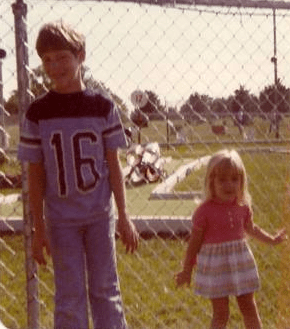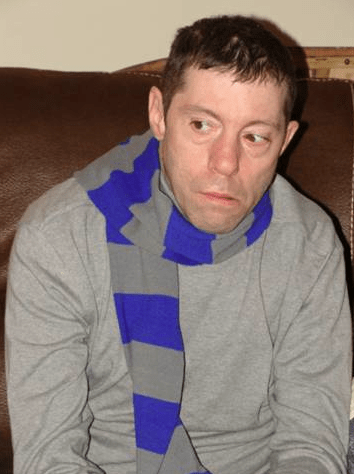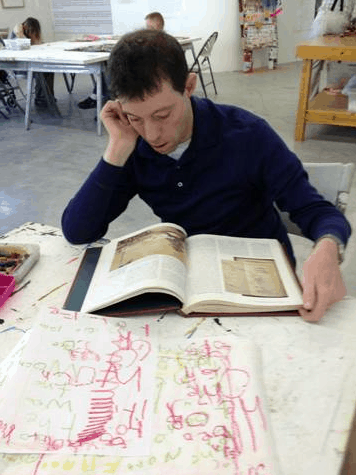Steven today
Hi guys, Miggy here. When I don’t have a new spotlight I like to pull one from the archives and feature it again. This was one of the first spotlights I did from a siblings perspective back in 2014 and it has stayed with me over the years. Probably the line I remember most is when I asked Jessica how she felt about taking over as her brother’s caregiver one day and she said, “Thanks for asking this. No one ever has.” It’s such a great benefit to us parents to hear from adult siblings what could have been more helpful for them growing up. I hope you enjoy this spotlight as much as I did. It is SO GOOD. Enjoy and Happy Friday! XO
*****
Thank you so much for having me, Miggy. My name is Jessica; I am a wife, mother to 2 boys, and a daughter of the King. My brother, Steven, has cerebral palsy, epilepsy, and severe brain damage as a result of trauma during a careless delivery. Steven has a child like mentality and needs help with all the basics: eating, bathing, dressing. A basic way to describe his mental understanding is he can write, but he can’t spell or read. He can just barely write his name, but most can’t read it. He can follow simple directions. Emotionally, he is generally mild mannered but has a violent temper, and has no real understanding of emotions or how to control them. Physically, Steven has tonic-clonic (formerly called grad mal) and absence seizures, even with medication. His limbs turn in, he drags his right leg, and he is bent forward. He can speak and has good grasp on language. While he has had his disabilities since birth, Steven has declined rapidly in the past few years compared to the first 40. He currently resides in an assisted living facility but my mother, who is 70, is still his primary care
giver. She has recently started including/training me in the many, many areas of his care from managing his medications to reporting to the judge on how he spends his SSI money.
***************
Miggy: Jessica, thank you so much for participating in my spotlight series. Today we’re talking about your brother who has cerebral palsy, epilepsy, and severe brain damage. I’m always glad to have a different perspective in our spotlight series, especially that of a sibling. You mentioned that your brother has cerebral palsy caused at birth by a careless delivery. Can you briefly share that story with us? What happened and how quickly did your parents realize your brother was going to have life long complications?
Jessica: My brother was born in 1968, and according to my mother–whom I consider the authority on the matter–the doctor was drunk. Steven was born with the aid of forceps, common then and not unheard of now, but his head was squished. He had large, red and purple bruises on his head. Yet he was breathing unassisted, eating and had a normal heart rate; the doctor told my mother not to worry. He was diagnosed with cerebral palsy at about 6 months old. The pediatrician then told my parents Steven would never walk, talk, etc., and recommended he be “institutionalized.” That doctor did not know my mother! That was not happening. But it was literally years before they knew the full extent of his injuries and what the complications would be. There was no indication of any problems during the pregnancy, my parents received no explanation and were offered little support from the medical community.

Steven and Me, 1980
Miggy: How did your brothers needs affect your family’s day-to-day life both when you were growing up and now? How did your parents balance his needs with yours and any other siblings you might have had? Any advice for us parents who are also trying to figure out that tricky balance?
Jessica: Since Steven’s mental abilities are child-like, the older he got the more his disabilities affected him, and us. Steven was appropriately functional and personable as a child for the most part.
Honestly, we didn’t have to accommodate him much. He had some seizures and his gait was compromised, so falls and head injuries were an issue. He loved participating in the Special Olympics, and was in the special education program through the public school system. I was never embarrassed or uncomfortable with him. My parents divorced soon after I was born, so for the first 10 years it was just the 3 of us*. My mom, my hero, had some support from my dad (mostly financial) but she really did it alone. This seemed normal to me but holy cow!! Looking back I cannot imagine how hard it must have been. She had a full time job outside the home and the full time job of managing Steven’s care. So balance didn’t really exist. The good news is I did well in school and was well behaved. I played by myself all the time. I did not have any extracurricular activities or play dates, and I was very lonely.My gained perspective from my childhood is that all family members need to be a part of the equation. My advice for any family is to spend one-on-one time with each child, and to do things together as a family, making sure everyone can be heard and express themselves. Every family’s “normal” is different, so acknowledge the differences and work through the issues and feelings that come with them. I think my mom tried to shield me, and I also think she just didn’t have the time. I wish now I had been more involved in Steven’s life growing up, and maybe I would have felt less isolated/closer to both of them.
Fast forward to now: Steven has activities every day. He loves an arts program called
Latitudes, where he attends twice a week. He spends many days with other disabled adults, many of whom he has known his whole life, in a day program. But he is very withdrawn and reacts violently when annoyed or frustrated. My mother still takes Steven to every doctor appointment (there are a lot),
micromanages the staff at his house/programs, and brings him to her house on the weekends. Nothing goes on in his life without her knowledge and approval. Steven must be directed to do basically anything. He has no logic skills -just like in the movie Rain Man- ask him how much a candy bar costs he’ll answer $100, ask him how much a car costs he’ll answer $100. Steven will talk to pretty much anyone, but he is hard to understand both because he mumbles and because he often doesn’t make sense. He has a terrible memory (example: if he spends the day with a friend wearing a purple shirt, Steven will call him “the purple guy”), so he is not exactly reliable for relaying information even about himself. He takes lots of medicine, and it is time sensitive, so it must be measured and available all the time. The seizures are no longer well controlled by medication and just about any change in his routine will cause one. Steven’s epilepsy is so sensitive that when the pharmaceutical company updated the coating on his
Dilantin, he had constant seizures and nearly died. It took weeks to figure out the problem. Now all Steven’s medicine is special ordered so it will never change. He has
osteoporosis on top of cerebral palsy, so as he ages his bones get more brittle, his legs and arms continue to turn in and his motor skills continue to deteriorate. He will soon need a wheelchair and eventually a feeding tube.

Steven at Latitudes
Miggy: What are the biggest worries you and your parents face for your brother?
Jessica: Oh mercy. Where to start? Steven is so physically and emotionally dependent on my mom. Once she cannot care for him, I cannot imagine how he will cope. I am afraid he will choke or aspirate his food. If he got lost or left the house alone, he could only tell someone his first name and that is assuming he even realized he needed help. He might hit his head having a seizure. He might fall and break any or every bone. Also, Steven is easy to ignore because he is quiet and I worry he will be neglected.
Miggy: Your mother has been his caretaker all his life, but that in a few years that responsibility will switch to you. First, tell us about your mom–how has she handled this responsibility and what have you learned from her?
Jessica: My mother loves; this is the #1 way to describe her. She has dedicated her life to Steven. Almost tied for #1 is that my mom is as tough as nails. She has stood up for Steven to doctors, principals, judges, you name it. She does not take any crap. It was a combination of these traits that led her to find an assisted living facility for Steven (he moved about 10 years ago). She needed help caring for him and she was concerned about him moving in with my family someday. She then spent YEARS researching places, and now he lives with one other disabled individual and a caregiver, in a private home managed by a private company with nurses and social workers. It is a far cry from
an institution and Mom is over there or on the phone with Steven every day. I suspect the staff is terrified of her.
My mom is working on releasing some control. She is teaching me how to handle the legal issues surrounding being an adult’s guardian, how to work with his many doctors, case workers and social workers, how to get him to eat, all kids of things. But the real lesson is how to be Steven’s champion, his defender, and his cheerleader.
Miggy: So how do you feel about becoming your brother’s primary caretaker? Is this something you willingly decided to take on or did you feel more of a family obligation? In your experience how can parents help make this type of transition the best possible for everyone involved?
Jessica: Thanks for asking this. No one ever has. Again, I say to parents: involve the family as much as possible. Communicate!
There was never any question that I will be taking over; no one ever asked me and I always knew it was coming. I want to say “he’s my brother!” and “I am happy to do it!” And it is true; I do love Steven and want the very best for him. But I am also terrified and very overwhelmed. And while I’m being honest, angry. I believe it is natural to have both kinds of feelings about it. I remind myself that no one chose this situation, and I pray for peace and patience. I am thankful for my amazing husband; he
married me knowing this would come down the pike and is 100% on board. I am glad we are transitioning gradually and that, God willing, I will be able to ask my mother when I need help. At this point I have no idea who will outlive the other, Mom or Steven.

My stepdad, Mom and Steven
Miggy: Now for a lighter question, I’m a big believer in seeing the humor in life and learning to laugh, so have you ever had any funny conversations/moments you never imagined due to your special
needs situations?
Jessica: Recently my husband, sons, and I spent a few days with Steven while my mom and stepdad were out of town. He had been very combative about going to his house, and since she was only going to gone a few days, my mom asked us to stay with him. When she was explaining things to
me, she said she had been putting his medicine in his mouth, serving him meals on the couch, and pulling the bed sheets back and tucking him in at night. I said, “Mom, he has really gone downhill if you have to do all this for him!” She sadly agreed. Well, while she gone, my husband and I put Steven to the test. I put his pills in his gnarled hand, and he took them. My husband helped him to bed, but he climbed in on his own. And he ate with us at the table. But as soon as my mom returned, Steven
moaned and groaned for a snack on the couch. He was playing her like a fiddle! I told her, “No wonder he wants to stay here, he is spoiled and has you snowed!”
Miggy: How can people best approach or respond to your brother? Is there something you wish other people knew so as to avoid awkward or hurtful situations?
Jessica: Steven truly loves attention (as seen in the story above!). He may not show it, but 95% of the time he wants people to talk to him. People should just ask Steven how he is doing, and listen even if they can’t understand the answer. He is very awkward and clumsy, so grace is always appreciated. I wish people knew how sensitive Steven is, he does not like to be stared at and he does get his feelings hurt even though he can’t explain it.
Miggy: What is the biggest lesson you’ve learned from having a brother with cerebral palsy and brain damage?
Jessica: There is so much good in this broken world; you just have to look for it. When Steven was young, and his body worked better, he laughed at everything; he still thinks pretty much everything
is funny and gives a smirk. Because he truly doesn’t understand his limitations, he doesn’t feel sorry for himself. And I am sure my mom feels cheated, and who knows what she does with the anger she must feel. Yet she has dedicated her life to caring for and loving Steven, not pursuing lawsuits or punishment for those at fault. While Steven’s circumstances are not what we would want, the lessons are universal: Choose joy. Choose love.
*My mom remarried when I was 11, and we gained 3 stepsiblings. They have been married 26
years, and we are all still close.
***************
Jessica I loved reading your thoughts, feelings and perspective about your brother Steven. It’s clear you love him deeply, yet like all siblings it hasn’t always been an easy road. I’m so glad you reached out because I love getting a siblings perspective on life with a special needs family member. First, your mom sounds like a rock star. I hope I can be as patient, strong and steadfast as your mother. Second, I admire your dedication to your brother as well. Perhaps there’s never been any question as to who would take over his care when your Mom is gone, but I don’t think that is something every sibling would take on. Thanks for your insights–so valuable for all us special needs parents. (Communicate! Check.) I love your final thoughts, There is so much good in this broken world; you just have to look for it…. Choose joy. Choose Love. Amen and amen. Thanks again Jessica, this was wonderful.
As always, if you or someone you know would like to participate in the special needs spotlight please email me, or have them email me directly, at thislittlemiggy at gmail dot com.
Have a great weekend!
XO,
Miggy
 Steven and Me, 1980
Steven and Me, 1980.png)





That was an amazing spotlight.
What a wonderful spotlight. Jessica’s voice and story are so essential to ALL of our lives and stories. Thank you!
Beautiful! The love and real-Ness expressed and shown in this and, really all the spotlights is inspiring and builds my faith in humanity. Thank you.